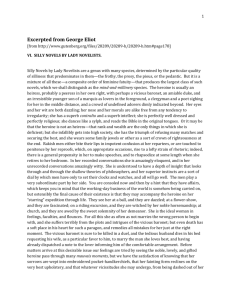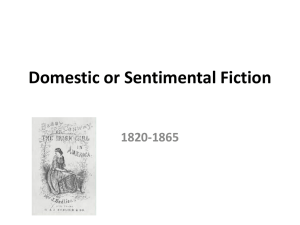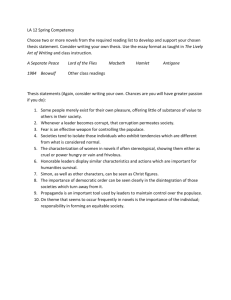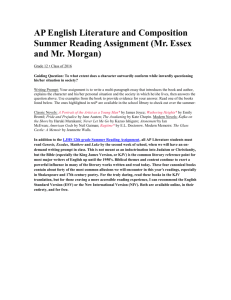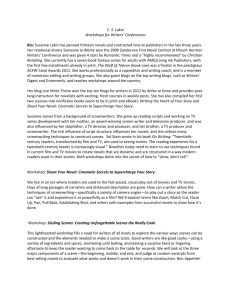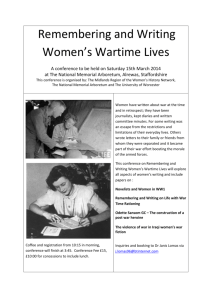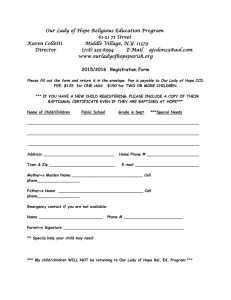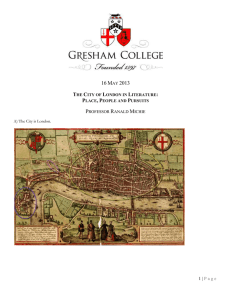Silly Novels by Lady Novelists
advertisement
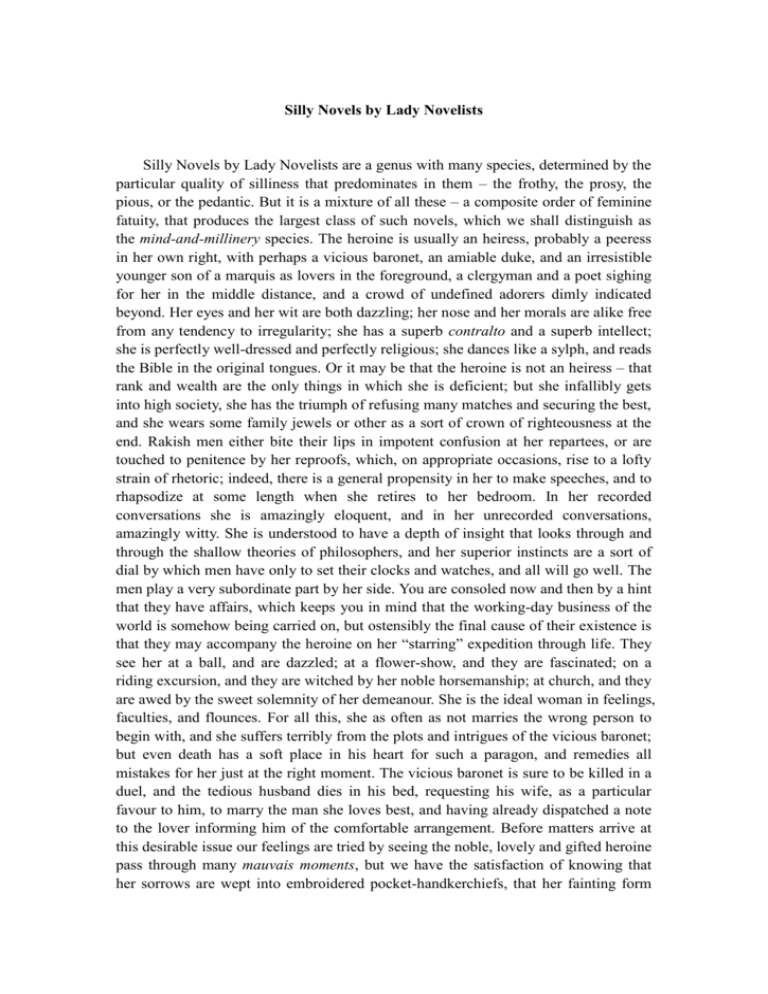
Silly Novels by Lady Novelists Silly Novels by Lady Novelists are a genus with many species, determined by the particular quality of silliness that predominates in them – the frothy, the prosy, the pious, or the pedantic. But it is a mixture of all these – a composite order of feminine fatuity, that produces the largest class of such novels, which we shall distinguish as the mind-and-millinery species. The heroine is usually an heiress, probably a peeress in her own right, with perhaps a vicious baronet, an amiable duke, and an irresistible younger son of a marquis as lovers in the foreground, a clergyman and a poet sighing for her in the middle distance, and a crowd of undefined adorers dimly indicated beyond. Her eyes and her wit are both dazzling; her nose and her morals are alike free from any tendency to irregularity; she has a superb contralto and a superb intellect; she is perfectly well-dressed and perfectly religious; she dances like a sylph, and reads the Bible in the original tongues. Or it may be that the heroine is not an heiress – that rank and wealth are the only things in which she is deficient; but she infallibly gets into high society, she has the triumph of refusing many matches and securing the best, and she wears some family jewels or other as a sort of crown of righteousness at the end. Rakish men either bite their lips in impotent confusion at her repartees, or are touched to penitence by her reproofs, which, on appropriate occasions, rise to a lofty strain of rhetoric; indeed, there is a general propensity in her to make speeches, and to rhapsodize at some length when she retires to her bedroom. In her recorded conversations she is amazingly eloquent, and in her unrecorded conversations, amazingly witty. She is understood to have a depth of insight that looks through and through the shallow theories of philosophers, and her superior instincts are a sort of dial by which men have only to set their clocks and watches, and all will go well. The men play a very subordinate part by her side. You are consoled now and then by a hint that they have affairs, which keeps you in mind that the working-day business of the world is somehow being carried on, but ostensibly the final cause of their existence is that they may accompany the heroine on her “starring” expedition through life. They see her at a ball, and are dazzled; at a flower-show, and they are fascinated; on a riding excursion, and they are witched by her noble horsemanship; at church, and they are awed by the sweet solemnity of her demeanour. She is the ideal woman in feelings, faculties, and flounces. For all this, she as often as not marries the wrong person to begin with, and she suffers terribly from the plots and intrigues of the vicious baronet; but even death has a soft place in his heart for such a paragon, and remedies all mistakes for her just at the right moment. The vicious baronet is sure to be killed in a duel, and the tedious husband dies in his bed, requesting his wife, as a particular favour to him, to marry the man she loves best, and having already dispatched a note to the lover informing him of the comfortable arrangement. Before matters arrive at this desirable issue our feelings are tried by seeing the noble, lovely and gifted heroine pass through many mauvais moments, but we have the satisfaction of knowing that her sorrows are wept into embroidered pocket-handkerchiefs, that her fainting form reclines on the very best upholstery, and that whatever vicissitudes she may undergo, from being dashed out of her carriage to having her head shaved in a fever, she comes out of them all with a complexion more blooming and looks more radiant than ever. We may remark, by the way, that we have been relieved from a serious scruple by discovering that silly novels by lady novelists rarely introduce us into any other than very lofty and fashionable society. We had imagined that destitute women turned novelists, as they turned governesses, because they had no other “lady-like” means of getting their bread. On this supposition, vacillating syntax and improbable incident had a certain pathos for us, like the extremely supererogatory pincushions and ill-devised nightcaps that are offered for sale by a blind man. We felt the commodity to be a nuisance, but we were glad to think that the money went to relieve the necessitous, and we pictured to ourselves lonely women struggling for a maintenance, or wives and daughters devoting themselves to the production of ‘copy’ out of pure heroism, -- perhaps to pay their husband’s debts, or to purchase luxuries for a sick father. Under these impressions we shrank from criticizing a lady’s novel; her English might be faulty, but, we said to ourselves, her motives are irreproachable; her imagination may be uninventive, but her patience is untiring. Empty writing was excused by an empty stomach, and twaddle was consecrated by tears. But no! This theory of ours, like many other pretty theories, has had to give way before observation. Women’s silly novels, we are now convinced, are written under totally different circumstances. The fair writers have evidently never talked to a tradesman except from a carriage window; they have no notion of the working classes except as “dependants”; they think £500 a year a miserable pittance; Belgravia and ‘baronial halls’ are their primary truths; and they have no idea of feeling interest in any man who is not at least a great landed proprietor, if not a prime minister. It is clear that they write in elegant boudoirs, with violet-coloured ink and a ruby pen; that they must be entirely indifferent to publishers’ accounts, and inexperienced in every form of poverty except poverty of brains. It is true that we are constantly struck with the want of verisimilitude in their representations of the high society in which they seem to live; but then they betray no closer acquaintance with any other form of life. If their peers and peeresses are improbable, their literary men, tradespeople, and cottagers are impossible, and their intellect seems to have the peculiar impartiality of reproducing both what they have seen and heard, and what they have not seen and heard, with equal unfaithfulness.
